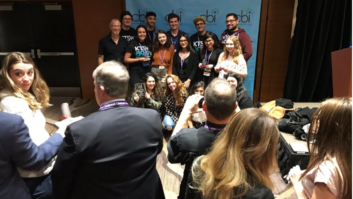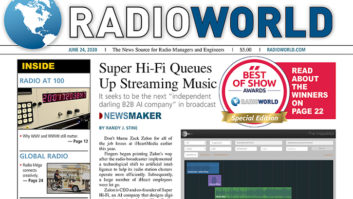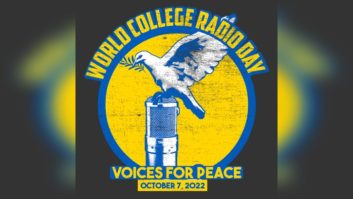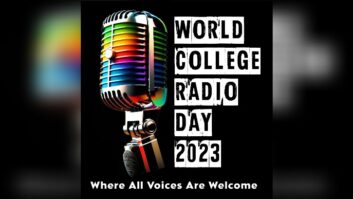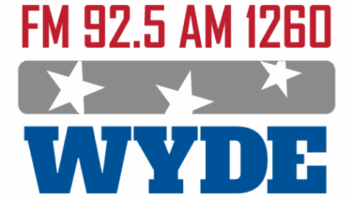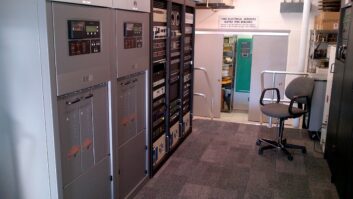The author is founder, College Radio Foundation and College Radio Day, and a professor at William Paterson University, New Jersey.
For many of us who started our broadcast careers in college radio, we still recall the memories of the experiences we had and the extraordinary bonding we shared with other students at the radio station. For most of us, it was in that environment that we not only learned or confirmed that we wanted to work in radio as a career, but we also created some friendships that would last a lifetime.
That all feels suddenly on hold for college radio students today. It seems that the very heart of their campus experience has been ripped away from them. Right now, most college radio stations studios are empty. The music director’s office is silent. The newsrooms are shut down, and the lounge area has empty sofas and chairs, with things left out on desks and tables, such as open magazines with half-read articles, unchecked lists of tasks that needed to be completed before spring break, and schedules for shows that will likely never take place. It’s like stumbling onto the Mary Celeste, a place that has been hastily abandoned on short notice.
[Read: College Radio and Coronavirus]
“Our students were on Spring Break when the world began to shut down. Their belongings were still on campus, and the uncertainty of what was next was definitely a huge factor on their anxiety levels,” said Anabella Poland, GM at WMSC, Montclair State University in New Jersey. “As information began to trickle down from authorities, there was a shift to first sadness, grieving their loss of community, loss of togetherness, and for some, the loss of their last semester on campus and all the celebratory activities this semester would bring.” For many involved in college radio, the shutdown was a massive blow.
For example, at the radio station that I manage, WPSC — Brave New Radio, at William Paterson University in New Jersey, we have had to cancel all our planned major events for the rest of this academic year. No more Braveathon, no annual Alumni Weekend (devastating for the alumni who love coming back), and no game coverage for our sports crew that lives and breathes competitive sports.
But there is hope, a resistance to the circumstances that the students now find themselves in. The COVID-19 situation may have resulted in campuses closing across the country, and the world, but students are not staying silent. Many students involved with college radio have quickly adapted and are finding new ways to create radio and find a way to communicate that to their audiences. It’s heartening to witness their passion combined with sheer ingenuity, to create and share content that provides information and comfort to a listening audience.
That’s true at WMSC, whose staff went from a period of mourning their losses to switching “to strength and sheer determination, to not let this time define us, and to explore the available options to continue to service our community,” said Poland. The students quickly committed to continuing their meetings and creating content, and “While emotions do vary day-to-day, based on news headlines and on each student’s individual circumstances, the group’s morale when they come together in virtual meetings and shows is good.” Poland shared, “I am not a psychologist, but I always begin my meetings asking how everybody is doing, I validate their shared feelings.”
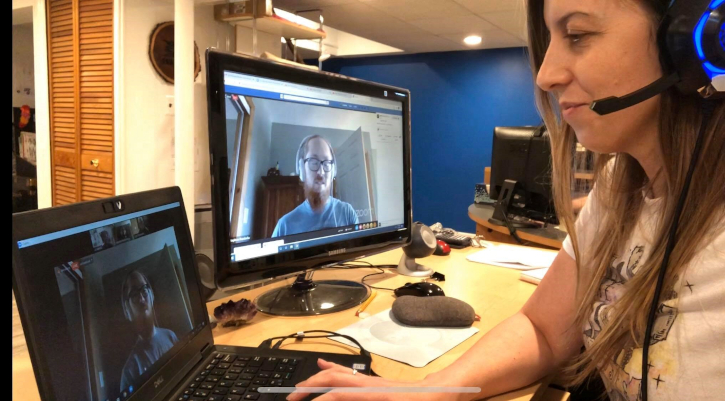
At Neumann University in Pennsylvania, close to Philadelphia, resiliency is a way of life. Director of Neumann Media, Sean McDonald, has been very busy. “Morale at my station (WNUW) has progressively gotten better,” he says. After the sudden shock of the situation, “The initial response was dead air. Nobody wanted to do anything,” said McDonald. But now the students are back to creating content.
“Because of my background in broadcast engineering, I quickly go into problem solving mode,” and so right now, “WNUW is fully operational, even though I am the only person legally allowed into the station. I took home a bunch of equipment and created my own remote studio/master control, and have complete control of our TV and radio studios. My students are doing both prerecorded and live radio shows in a variety of methods,” he explained.
Those methods include using Discord to record shows, as well as Skype, Zoom or MS Teams. But because of McDonald’s engineering background he has been able to set-up a lot of technology from his home. “I have been using Axia’s SoftSurface over our school’s VPN client to control our Axia Fusion console. I set-up our record bus to a recorded feed in our iProfiler system, so I can hear callers that may call the studio through the Live Player app, and I have VPN access to control our RCS Zetta system … I’ve also given the more tech-savvy students access to the Comrex FieldTap app, and they can dial into one of my other Comrex units to get on the air. Like I said, having a broadcast engineering background certainly comes in handy during a pandemic!”
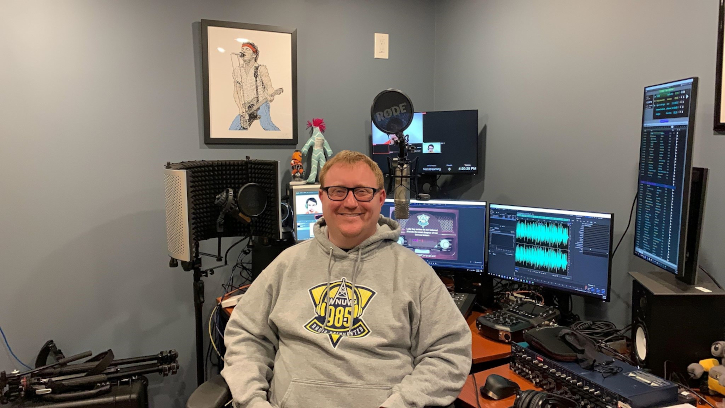
Poland is also using similar strategies and technologies to keep WMSC on the air. “We began broadcasting via Zoom on FB Live and uploading the shows to YouTube and SoundCloud, and then our chief engineer procured the necessary software to remote us into the station. Now we do our morning show live Monday through Friday. We also host two other news shows live. As we get more comfortable with this new modus operandi, we are adding prerecorded shows to our RCS NexGen lineup.”
Both Poland and McDonald have been working together to develop a project called the College Radio News Network (CRNN), which was conceived by Poland a while ago, and was already being used to share content and programming for celebratory occasions such as the annual College Radio Day and Vinylthon events. But the current situation now offers a perfect scenario for people to collaborate and share material that would help stations in this difficult time. The CRNN could be a vital tool for college radio stations during this time of social distancing, allowing students from college stations across the world to connect, share content, and participate in each other’s broadcasts.
So, looking to improve the process, Poland reached out to McDonald at Neumann University, to create a space that would allow for easy content sharing. “In order to keep the CRNN free to use and access, I had to find a way for stations to be able to contribute content that would not take too much time — I was looking for a way for people to easily upload and download content. Sean’s extensive technological background was vital to creating that space,” said Poland.
McDonald was able to set-up a space on a secure server at his university and was happy to help Poland take her idea to the next level. “The College Radio Network is the baby of Anabella Poland. We all have different perspectives, coming from all over the country. The idea of the website is to share copyright-free material created by college radio, for college radio. Newscasts are how this started, but we’re also looking to share coronavirus content in various forms. From interviews with front line workers, to diaries of how you’re feeling, to play-by-play of your mother in the kitchen making pancakes (true story), we want to give content to stations to share and to be the voice of the pandemic. There’s no obligation or pressure, just another resource to use during this strange time in our world,” said McDonald.
Other initiatives are also taking place, such as the College Coronavirus Coverage Awards, organized by four major journalism organizations — The Society of Professional Journalists, the Associated Collegiate Press, the Society for News Design, and College Broadcasters Inc. — who have joined forces to recognize college journalists who are “admirably covering a pandemic for little or no money while struggling with online classes.” The awards invite content from students “about COVID-19 that informed your audience of students, faculty, staff, administration, and alumni,” according to the website.
All these developments and initiatives are evidence that this difficult time can be met with responses of ingenuity and determination to connect with others. “Bringing my studio to my house has made me excited to go to work, and excited to problem solve,” said McDonald. He added, “Right now I’m loving what I’m doing and I’m making the best of it!” There is the belief that college radio should not be silent during this time. As Poland says, for her students, “There is a sense of urgency and duty to be on the front lines covering a historic moment, and to not allow the virus to take that from them.”
Perhaps something good can come from a bleak moment in time, and college radio can step up and help fill the silence.
